The history of the Civil Rights Movement in America is filled with stories of brave individuals who stood up for their rights in the face of hatred and racism. One such courageous fighter is Autherine Juanita Lucy, who in February 1956 became the first African American student to attend a white university or public school in Alabama.
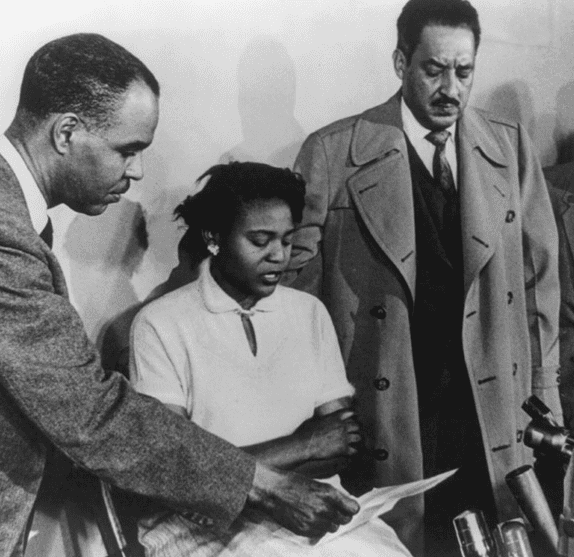
It had taken her four long years of perseverance and legal battles to be admitted to the University of Alabama, but her presence on the all-white campus stirred up such a frenzy of hateful rioters that after only four days, the university ordered her exclusion “until further notice” due to safety considerations.
Undaunted, Lucy informed the university on 7 February 1956 that unless she was reinstated within 48 hours, she would sue the school and its administrators for barring her from attending classes. The university had a real fight – and fighter – on its hands.
Lucy was a true pioneer. She began her fight to attend the University of Alabama in 1952, two years before the U.S. Supreme Court issued its historic Brown v. Board of Education of Topeka decision, ruling that segregation in public schools was unconstitutional. In support of Lucy’s court battle, the Supreme Court issued another ruling on 10 October 1955 telling the University of Alabama it could not deny admittance to a student on the basis of race.
Armed with this legal victory, Lucy attended her first class at the university on Friday, 3 February 1956, even though the university barred her from using the dining halls and dormitories. She also attended classes Saturday morning and Monday morning. Throughout this time, however, ugly racial riots exploded on campus and in downtown Tuscaloosa. Lucy was taunted and pelted with eggs and rocks, while demonstrators chanted “Keep ’Bama white!”
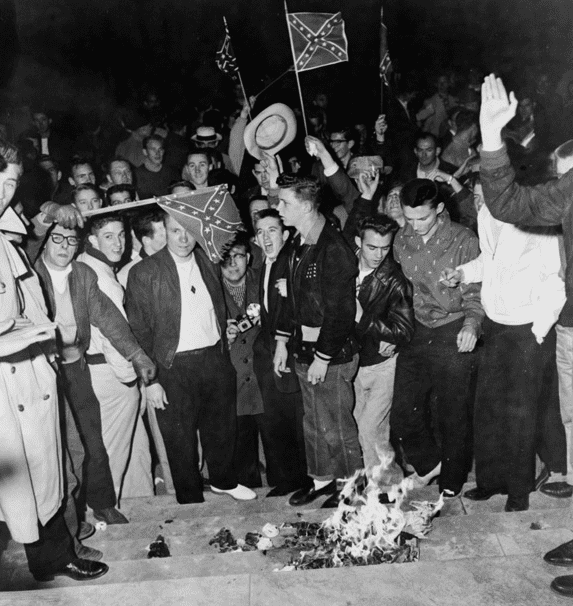
On Monday evening, the university’s board of trustees issued their infamous order excluding Lucy “until further notice.” The next day, February 7, Lucy responded with her ultimatum to be reinstated within 48 hours or there would be further legal action. The university refused to budge, and Lucy filed suit.
Although the court ruled that Lucy had to be reinstated, the university used her lawsuit as justification for permanently expelling Lucy – saying her lawsuit had “slandered” the school. Lucy and her supporters, including the National Association for the Advancement of Colored People, decided there was no point to any further legal action.
It was not until 1980 that the University of Alabama finally rescinded her expulsion, and in 1992 the proud, determined Autherine Lucy earned her Masters degree in Elementary Education from the University of Alabama. The school now has an endowed scholarship honoring her, and her portrait hangs in the student union.
The following seven newspaper articles – four news stories and three editorials – give a variety of perspectives on Lucy’s fight for her right to be educated at her state’s university.
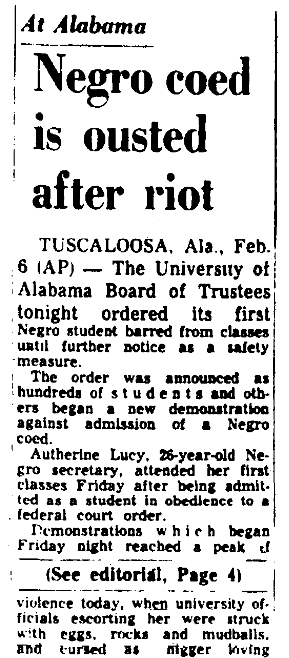
Here is a transcription of this article:
At Alabama
Negro Coed Is Ousted after Riot
TUSCALOOSA, Ala., Feb. 6 (AP) – The University of Alabama Board of Trustees tonight ordered its first Negro student barred from classes until further notice as a safety measure.
The order was announced as hundreds of students and others began a new demonstration against admission of a Negro coed.
Autherine Lucy, 26-year-old Negro secretary, attended her first classes Friday after being admitted as a student in obedience to a federal court order.
Demonstrations which began Friday night reached a peak of violence today [Monday], when university officials escorting her were struck with eggs, rocks and mudballs, and cursed as “nigger-loving ______.”
A brief announcement by the trustees said they were acting “for the safety of other students, and of faculty members of the University of Alabama, and only for that reason, and exercising the police power of the University of Alabama for the safety of those on the campus.”
Spattered with eggs
Tuscaloosa Police Chief W. C. Tompkins was spattered with eggs as he directed officers in breaking up hundreds of students who gathered around the flagpole in the heart of downtown Tuscaloosa tonight.
Miss Lucy was struck by eggs while being escorted across the campus this morning, and windows of the car in which she rode were smashed.
Highway patrol officers slipped her away at the height of the demonstration when more than 3,000 students and others were on the campus. Her attorney said whether she returned to classes tomorrow would depend on whether “the situation is under control.”
Dr. O. C. Carmichael, university president, told faculty members at an emergency meeting that “if we cannot operate under law and order it may be necessary to close up shop.”
The university Board of Trustees held a closed meeting tonight. Newsmen who attempted to enter the session were barred.
The crowd tonight, estimated at about 1,000, later marched through the campus waving Confederate flags and shouting “Hey, hey, ho, ho, Autherine gotta go.”
Two [three] arrested
Three nonstudents were arrested and charged with disorderly conduct following the violent campus demonstration.
Miss Lucy attended morning classes but telephoned her attorney that school officials advised her not to go to afternoon classes.
Miss Lucy was driven away from Graves Hall under heavy police escort while members of the mob around the building were distracted by a daring Negro decoy.
An unidentified Negro man attracted the attention of the crowd by standing in front of Union Hall across the street from Graves.
He strolled away along University Ave. As those nearest to him began closing in Tuscaloosa police hustled him into a car before he was harmed although some men struck at him.
Peter Kihss, New York Times newsman who had been talking with the man, was struck by eggs.
While attention of the mob was drawn elsewhere, Miss Lucy was hurried into a waiting car and driven off by a highway patrolman. Six other officers followed in another car.
The crowd began thinning out as word spread the woman had left. A few remaining threw eggs and tomatoes at passing cars and buses in which Negroes were riding.
Note: That same day, the Augusta Chronicle ran this editorial, saying that the tragedy is not that Lucy was being denied her rights, but rather that the courts were usurping states’ rights by interfering with the University of Alabama’s discriminatory admittance policy.
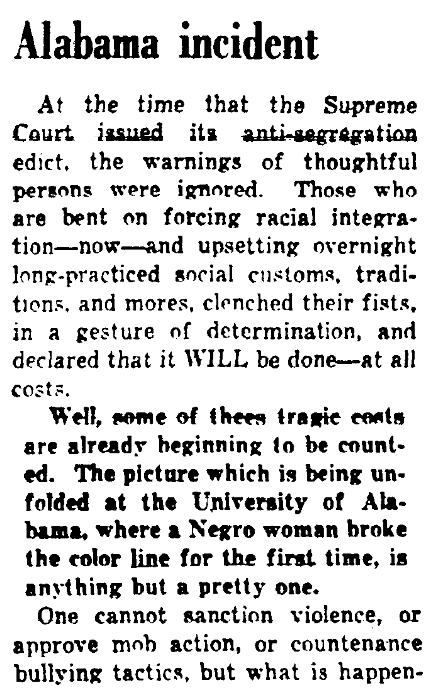
Here is a transcription of this article:
Alabama Incident
At the time that the Supreme Court issued its anti-segregation edict, the warnings of thoughtful persons were ignored. Those who are bent on forcing racial integration – now – and upsetting overnight long-practiced social customs, traditions, and mores, clenched their fists, in a gesture of determination, and declared that it WILL be done – at all costs.
Well, some of these tragic costs are already beginning to be counted. The picture which is being unfolded at the University of Alabama, where a Negro woman broke the color line for the first time, is anything but a pretty one.
One cannot sanction violence, or approve mob action, or countenance bullying tactics, but what is happening to this Negro student at the University of Alabama cannot be ignored or glossed over. So far, there have been three sizable demonstrations against her presence in the University classrooms, the latest involving an egg shower by an angry crowd. She has to be escorted to and from classrooms by policemen, who also find it necessary to block off the street wherever she passes as insulting and derisive cries go up from the crowds. The situation is deplorable all around.
The courts can issue legal edicts, and declare that they must be enforced, but the courts cannot dictate human nature and regulate the feelings of human beings.
It is the great tragedy of our time that the Supreme Court has seen fit to issue a sociological decision which is bound to create ill-will, bring bad relations between our people, as the University of Alabama incident proves, and provide the medium for violence.
It is nothing less than tragic that the Supreme Court has furnished both the dynamite and the match by usurping the power of the various states to operate their schools, and other public facilities, in a manner best fitted to the needs and the welfare of all of their people. For this the court must bear the onus for ushering in an unhappy and tragic era in our history whereas before its decision, all was going well.
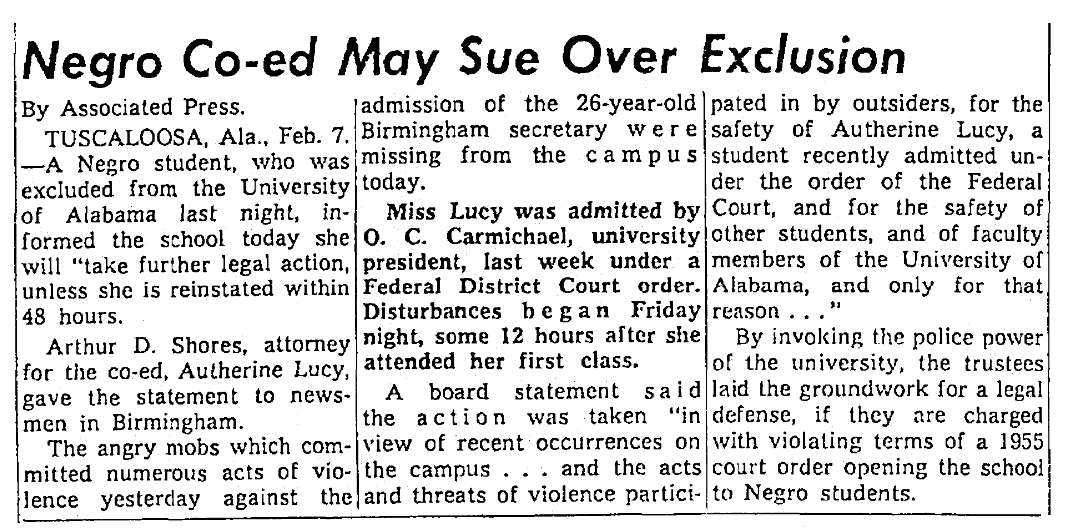
Here is a transcription of this article:
Negro Co-ed May Sue Over Exclusion
By Associated Press.
TUSCALOOSA, Ala., Feb. 7. – A Negro student, who was excluded from the University of Alabama last night, informed the school today she will “take further legal action, unless she is reinstated within 48 hours.”
Arthur D. Shores, attorney for the co-ed, Autherine Lucy, gave the statement to newsmen in Birmingham.
The angry mobs which committed numerous acts of violence yesterday against the admission of the 26-year-old Birmingham secretary were missing from the campus today.
Miss Lucy was admitted by O. C. Carmichael, university president, last week under a Federal District Court order. Disturbances began Friday night, some 12 hours after she attended her first class.
A board statement said the action was taken “in view of recent occurrences on the campus… and the acts and threats of violence participated in by outsiders, for the safety of Autherine Lucy, a student recently admitted under the order of the Federal Court, and for the safety of other students, and of faculty members of the University of Alabama, and only for that reason…”
By invoking the police power of the university, the trustees laid the groundwork for a legal defense, if they are charged with violating terms of a 1955 court order opening the school to Negro students.
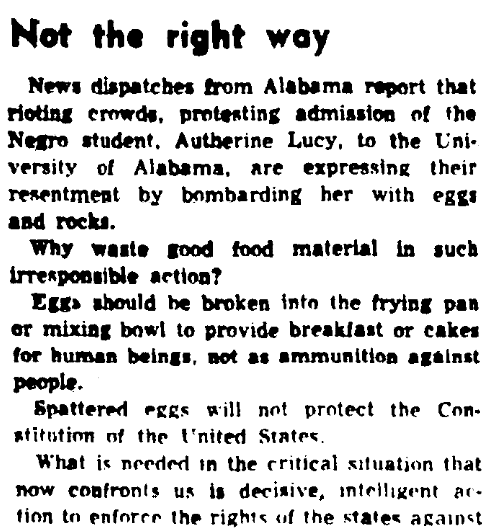
Here is a transcription of this article:
Not the Right Way
News dispatches from Alabama report that rioting crowds, protesting admission of the Negro student, Autherine Lucy, to the University of Alabama, are expressing their resentment by bombarding her with eggs and rocks.
Why waste good food material in such irresponsible action?
Eggs should be broken into the frying pan or mixing bowl to provide breakfast or cakes for human beings, not as ammunition against people.
Spattered eggs will not protect the Constitution of the United States.
What is needed in the critical situation that now confronts us is decisive, intelligent action to enforce the rights of the states against the encroachments of illegally-assumed court authority and encroachments of a strongly centralized and highly biased government.
The efforts of sane leaders to work out peaceful solutions to dangerously explosive problems will be wrecked by violence and unintelligent mob action directed against single individuals.
To drive Autherine Lucy from the University of Alabama will not eradicate an issue that involves the rights of millions of Americans, for whom the Constitution of the United States has always served as a bulwark of liberty and justice under law.
The fight that must be made must be based on the large issue of the right of the states to govern themselves in all matters in which responsibility was not delegated to the central government.
This fight cannot be won by barrages of eggs and rocks.
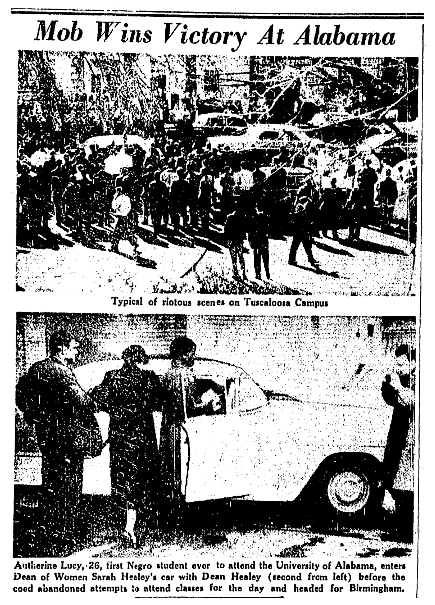
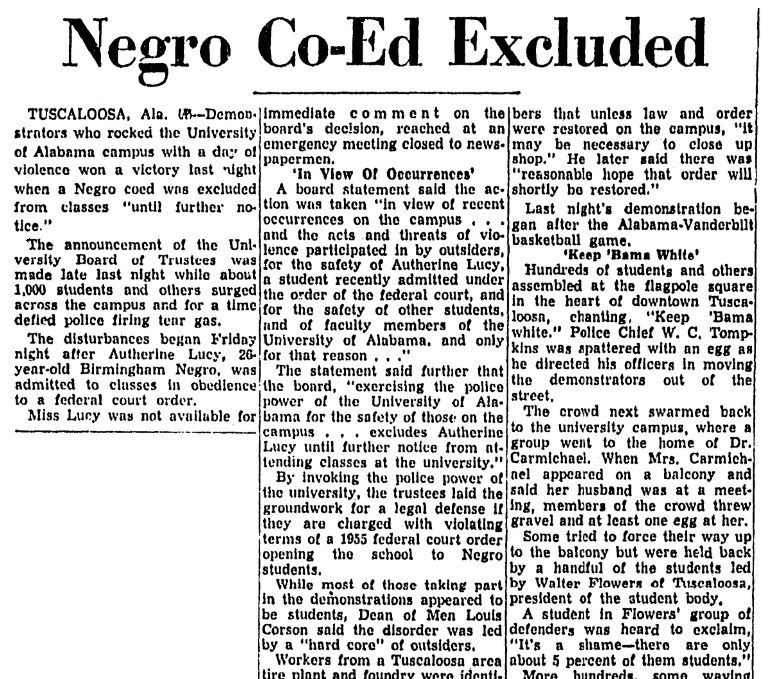
Here is a transcription of this article:
Negro Co-Ed Excluded
TUSCALOOSA, Ala. (AP) – Demonstrators who rocked the University of Alabama campus with a day of violence won a victory last night when a Negro coed was excluded from classes “until further notice.”
The announcement of the University Board of Trustees was made late last night while about 1,000 students and others surged across the campus and for a time defied police firing tear gas.
The disturbances began Friday night after Autherine Lucy, 26-year-old Birmingham Negro, was admitted to classes in obedience to a federal court order.
Miss Lucy was not available for immediate comment on the board’s decision, reached at an emergency meeting closed to newspapermen.
‘In View of Occurrences’
A board statement said the action was taken “in view of recent occurrences on the campus… and the acts and threats of violence participated in by outsiders, for the safety of Autherine Lucy, a student recently admitted under the order of the federal court, and for the safety of other students, and of faculty members of the University of Alabama, and only for that reason…”
The statement said further that the board, “exercising the police power of the University of Alabama for the safety of those on the campus… excludes Autherine Lucy until further notice from attending classes at the university.”
By invoking the police power of the university, the trustees laid the groundwork for a legal defense if they are charged with violating terms of a 1955 federal court order opening the school to Negro students.
While most of those taking part in the demonstrations appeared to be students, Dean of Men Louis Corson said the disorder was led by a “hard core” of outsiders.
Workers from a Tuscaloosa area tire plant and foundry were identified on the campus yesterday when university officials were cursed and struck with rocks and eggs. Windows of a car in which Miss Lucy was driven across the campus were smashed.
Dr. O. C. Carmichael, university president, had told faculty members that unless law and order were restored on the campus, “it may be necessary to close up shop.” He later said there was “reasonable hope that order will shortly be restored.”
Last night’s demonstration began after the Alabama-Vanderbilt basketball game.
‘Keep ’Bama White’
Hundreds of students and others assembled at the flagpole square in the heart of downtown Tuscaloosa, chanting “Keep ’Bama white.” Police Chief W. C. Tompkins was spattered with an egg as he directed his officers in moving the demonstrators out of the street.
The crowd next swarmed back to the university campus, where a group went to the home of Dr. Carmichael. When Mrs. Carmichael appeared on a balcony and said her husband was at a meeting, members of the crowd threw gravel and at least one egg at her.
Some tried to force their way up to the balcony but were held back by a handful of the students led by Walter Flowers of Tuscaloosa, president of the student body.
A student in Flowers’ group of defenders was heard to exclaim, “It’s a shame – there are only about 5 percent of them students.”
More hundreds, some waving Confederate flags, milled around near the school’s Union Building and refused to obey police orders to disperse.
When officers fired tear gas shells, members of the mob put handkerchiefs over their faces and began shooting firecrackers.
The demonstration began breaking up about midnight as news of the trustees’ action spread.
Crowd over 3,000
Crowds estimated at more than 3,000 demonstrated on the campus yesterday when Miss Lucy attended classes for the third day. She slipped away under heavy police escort after attending two morning classes and returned to Birmingham.
The National Assn. for the Advancement of Colored People called on Gov. James E. Folsom to “use full powers” of his office to maintain order at the university and protect Miss Lucy.
Folsom said at Montgomery that he does not plan to call out the National Guard to quell the disorders, but the state “stands ready at all times to meet with any situation properly.”
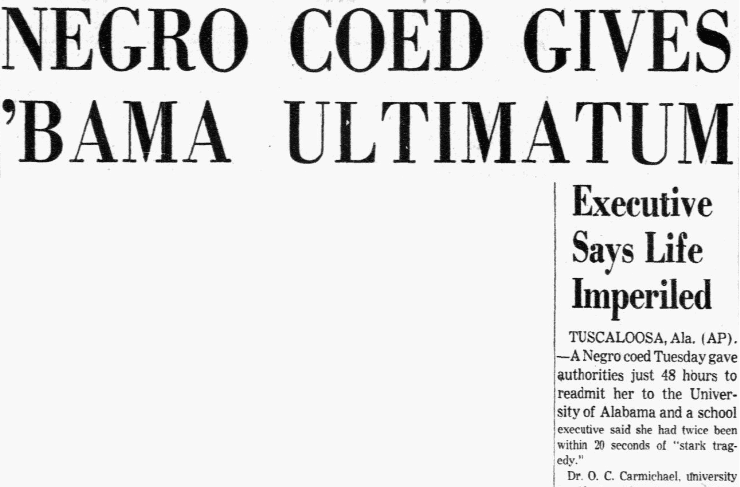
Here is a transcription of this article:
NEGRO COED GIVES ’BAMA ULTIMATUM
Executive Says Life Imperiled
TUSCALOOSA, Ala. (AP) – A Negro coed Tuesday gave authorities just 48 hours to readmit her to the University of Alabama and a school executive said she had twice been within 20 seconds of “stark tragedy.”
Dr. O. C. Carmichael, university president, said assistant president Jeff Bennett told him that Autherine Lucy was in real danger during riotous demonstration against her presence on the campus Monday.
“I can think of nothing worse than a student being murdered on this campus,” Carmichael said in addressing a faculty meeting. Carmichael said Bennett told him that she twice was 20 seconds from “stark tragedy.”
Miss Lucy was excluded by the board of trustees “until further notice” [Monday] night following a series of demonstrations by students and outsiders.
A resolution asserting that the university cannot operate unless faculty and students are protected from “mob rule” was submitted to the gathering of about 400 instructors. Dr. Carmichael ruled it was tabled by a voice vote.
The faculty voted on the resolution after Dr. Carmichael explained the board’s action. He said outsiders who “invaded our campus” were “largely responsible for the resulting disorder.” He said the board “dared not postpone action lest greater violence” should follow.
Carmichael moved adjournment but assistant political science professor Charles D. Farris objected, saying, “I can see no reason why the faculty should be compelled to agree with the action of the board of trustees.”
Farris offered a resolution asking the faculty to condemn “mob rule” at the school. The resolution said the university cannot continue to operate under such conditions with threats to faculty and students, and asked for civil or military protection for them.
The instructor said the resolution called for the university to suspend operations if these conditions could not be provided.
Professor Fred Ogden asked “why police protection had not been more adequate at this time.” He also is a member of the political science department.
Art professor Lawrence Calcagno said he wanted to express the personal feeling that “our university has succumbed to mob rule.”
Tuscaloosa police used tear gas to break up a crowd of more than 1,000 persons chanting “Keep ’Bama white” and waving Confederate flags.
The board said its action was for the safety of its students, faculty and Miss Lucy, and was taken under the police powers of the university. This was expected to give the trustees a defense if they are accused of defying a federal court order directing the school not to bar Negroes on account of their race.
The board barred Miss Lucy temporarily after demonstrations prevented her from attending classes Monday. Her presence at morning sessions attracted a mob of 2,000 to 3,000 persons, who threw rocks and eggs.
Miss Lucy told newsmen she was hit by one egg on the left shoulder while on the way to attend a class in children’s literature.
Miss Lucy met with newsmen in Birmingham in the office of her attorney, Arthur D. Shores, after spending the night in an undisclosed rural area.
“I am still determined to attend the University of Alabama,” she said.
“All this furor,” she added, referring to Monday’s rioting, “should not help or hinder my chances at the university.”
“I don’t think a majority of the students were involved” in the rioting, she went on. “I think it was a minority group, with outsiders.”
Miss Lucy said she agreed that it would have been unwise for her to attend her afternoon classes on the Tuscaloosa campus Monday.
“I will be happy to know I can get the type of education I desire without going out of the state,” she said, “because I want to give my services in Alabama. I think it is best to get my education here.”
Shores said in his telegram to the university, “it is regrettable that the University of Alabama would submit to mob rule in excluding Miss Lucy.
“It is the responsibility of the state of Alabama to guarantee and insure Miss Lucy’s safety, and she expects the university to reinstate her within the next 48 hours or we will be compelled to take further legal action.”
Both the Alabama senate and house meanwhile passed a resolution introduced by Sen. Sam Engelhardt commending the university trustees for barring Miss Lucy.
In Washington, Sen. Harley Kilgore (Dem.) of West Virginia said he has asked Atty. Gen. Herbert Brownell to investigate the demonstrations to determine whether any federal statutes were violated.
Miss Lucy is one of eight children. Her family lives in Marengo County, in the midst of what was the cotton plantation area of the state, and where Negroes still outnumber whites more than two to one.
She gained entrance to the university through a federal court injunction, after a court fight lasting since 1952. She already is a graduate of Miles College in Birmingham, a Methodist school for Negroes only.
In Congress, meanwhile, Rep. Irvin Davidson (Dem.) of New York denounced the riots and referred to the participants as “foul rabble.”
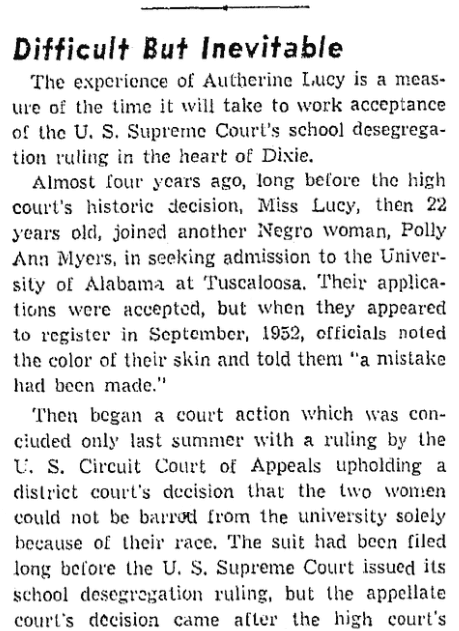
Here is a transcription of this article:
Difficult but Inevitable
The experience of Autherine Lucy is a measure of the time it will take to work acceptance of the U.S. Supreme Court’s school desegregation ruling in the heart of Dixie.
Almost four years ago, long before the high court’s historic decision, Miss Lucy, then 22 years old, joined another Negro woman, Polly Ann Myers, in seeking admission to the University of Alabama at Tuscaloosa. Their applications were accepted, but when they appeared to register in September, 1952, officials noted the color of their skin and told them “a mistake had been made.”
Then began a court action which was concluded only last summer with a ruling by the U.S. Circuit Court of Appeals upholding a district court’s decision that the two women could not be barred from the university solely because of their race. The suit had been filed long before the U.S. Supreme Court issued its school desegregation ruling, but the appellate court’s decision came after the high court’s action.
It was on the basis of the appellate decision that Miss Lucy was finally enrolled at the beginning of the current term. The other woman had, in the interim, been married and divorced, and the university administration denied her entry on the grounds of her “conduct and marital record.” Now Miss Lucy has been excluded from classes “until further notice” as a result of the rioting that occurred during the first days of her attendance. Already she had been barred from the university dormitory and cafeteria and had been commuting from Birmingham, 58 miles from Tuscaloosa.
It is not every student that would choose such a long and rocky road to education in promotion of a principle. But there must always be pioneers; and can there be any doubt that eventually even Alabama must desist from discriminating so boldly against certain of its citizens?
The score for desegregation is by no means poor. It has progressed smoothly in many border states, especially in institutions of higher education. Last fall the last of Oklahoma’s 18 colleges and universities abolished segregation. A few weeks ago the University of New Mexico, in a state that has practiced segregation under a permissive state law, hired as its new dean of education Dr. Chester C. Travelstead, who in November had been dismissed by the University of South Carolina for delivering a speech in favor of school desegregation. Incidentally, the University of South Carolina’s student newspaper has supported Dr. Travelstead.
As for student opinion, it should be noted that the president of the associated students at the University of Alabama and a group of friends defended members of the university faculty against rioters who were shouting “Keep ’Bama white.” One of this group exclaimed, “It’s a shame – there are only about 5 percent of them students.”
It’s a shame, for certain. But some repetition of the Tuscaloosa incident must be anticipated as the South moves painfully into a new era of relationships between the races. The violence on the Alabama campus is an indication of the difficulties that lie ahead, but it should not be interpreted as rendering any less inevitable the attainment of a higher level of justice for the southern Negro.
Note: An online collection of newspapers, such as GenealogyBank’s Historical Newspaper Archives, is not only a great way to learn about the lives of your ancestors – the old newspaper articles also help you understand American history and the times your ancestors lived in, and the news they talked about and read in their local papers. The same is true of more recent news. Were you or any of your family involved in desegregating Southern schools?
Related Articles:
